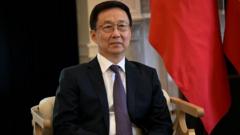This unprecedented choice reflects China's willingness to engage with the incoming US administration, even amid concerns over potential trade tensions.
China's Vice-President Han Zheng to Attend Trump's Inauguration

China's Vice-President Han Zheng to Attend Trump's Inauguration
In a historic diplomatic gesture, China is sending Vice-President Han Zheng to Donald Trump's inauguration as the first senior Chinese official to witness such an event.
China has decided to send Vice-President Han Zheng as its representative at the inauguration of US President-elect Donald Trump, marking the first occasion when a high-ranking Chinese leader will be present at such a momentous event. This decision diverges from tradition, as foreign leaders typically refrain from attending US presidential inaugurations. Trump has invited various global leaders, including Chinese President Xi Jinping, indicating a desire for open dialogues with nations perceived as both allies and rivals.
Amidst this diplomatic overture, Beijing prepares for a Trump administration that many speculate will introduce new tariffs on Chinese imports and adopt a more confrontational rhetoric. Notably, Marco Rubio, nominated for Secretary of State, has labeled China as the most formidable adversary America has ever faced. Han's presence at the inauguration is seen as a strategic move by Xi, as it demonstrates a commitment to engage in negotiations without appearing subordinate.
While Xi Jinping has historically opted not to attend inaugurations, instead delegating representatives, sending Han signals China’s interest in forging a working relationship with the Trump administration. Han, who assumed the role of vice-president in March 2023, is viewed as having a senior status and has experience attending foreign state functions, including the recent inauguration of Indonesia’s president.
Observers suggest that this choice of envoy conveys a message of courtesy to the incoming Trump administration, while also keeping some distance due to Han's lack of ties to Xi's inner circle. His involvement in foreign affairs, particularly as a promoter of the Belt and Road initiative and oversight of the 2022 Winter Olympics, adds weight to his role.
In the eyes of political analysts, this diplomatic engagement emphasizes China’s pragmatic approach amidst a complex international landscape, showing a readiness to navigate potentially rough waters in US-China relations following Trump's inauguration.
Amidst this diplomatic overture, Beijing prepares for a Trump administration that many speculate will introduce new tariffs on Chinese imports and adopt a more confrontational rhetoric. Notably, Marco Rubio, nominated for Secretary of State, has labeled China as the most formidable adversary America has ever faced. Han's presence at the inauguration is seen as a strategic move by Xi, as it demonstrates a commitment to engage in negotiations without appearing subordinate.
While Xi Jinping has historically opted not to attend inaugurations, instead delegating representatives, sending Han signals China’s interest in forging a working relationship with the Trump administration. Han, who assumed the role of vice-president in March 2023, is viewed as having a senior status and has experience attending foreign state functions, including the recent inauguration of Indonesia’s president.
Observers suggest that this choice of envoy conveys a message of courtesy to the incoming Trump administration, while also keeping some distance due to Han's lack of ties to Xi's inner circle. His involvement in foreign affairs, particularly as a promoter of the Belt and Road initiative and oversight of the 2022 Winter Olympics, adds weight to his role.
In the eyes of political analysts, this diplomatic engagement emphasizes China’s pragmatic approach amidst a complex international landscape, showing a readiness to navigate potentially rough waters in US-China relations following Trump's inauguration.






















